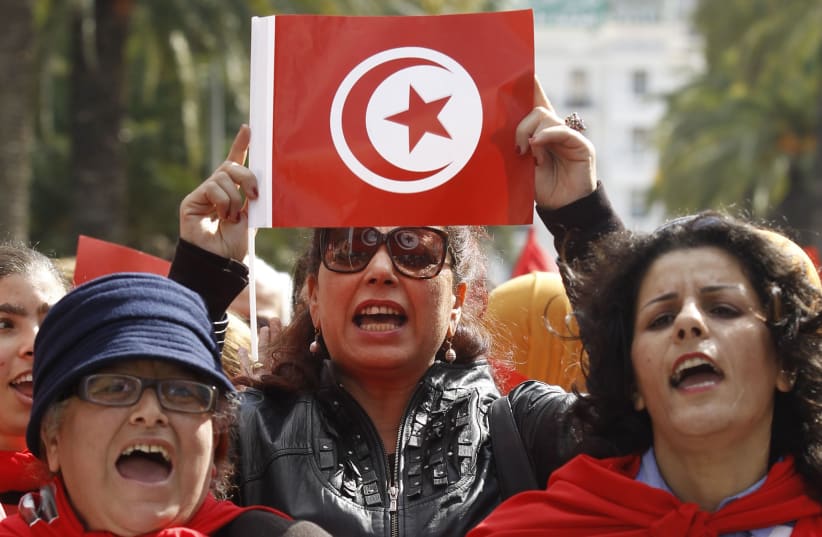Polygamy is the umbrella term for the practice of marrying multiple spouses. Polygyny, which refers to a man married to more than one wife at a time, is the more precise sociological term for the phenomenon in question.
Last month, a group of Tunisian women reportedly took to social media to organize a pro-polygamy protest. The practice is outlawed in the North African nation and is widely considered taboo. Nevertheless, the group aims to amend the law by staging demonstrations outside government buildings.
According to a recent report by Tunisia’s National Office for Family and Population, the country has one of the highest number of single women in the Arab world. It revealed that as of last year their numbers increased to more than 2.25 million out of a total of 4.9 million females in the country.
Meanwhile in Egypt a similar social dynamic has sparked calls for increased polygamy. The Middle East Media Research Institute (MEMRI) reported that a debate on the matter recently took place on television with one sympathizer, Saber Ghanem, saying it
“is permitted under Shari’a [Islamic law]" and would address "a ticking time bomb in our society: 11 million [single] women who have surpassed the age of marriage.”
Ghanem argued that every human, including these women—wives, divorced women and widows—has “natural” and “sexual needs” which need to be satisfied and that polygamy adequately addresses this problem. “Another advantage of polygamy,” he added, “is that it strengthens the bonds between tribes, families and countries.”
Egypt allows the practice but restricts a Muslim man from marrying more than four wives. The husband must also gain the consent of his current wife or wives if hopes to take on more.
Dr. Janet Bennion, Professor of sociocultural anthropology at Northern Vermont University and an expert on polygamy, told The Media Line that the practice “is a viable alternative to a variety of alienating conditions, especially in patriarchal environments that do not always allow women the same rights and access to political and economic promotion.”
Women who are single, under such conditions, are often left destitute and without an economic and domestic network, she explained. Divorced, widowed and abandoned women also seek a supportive framework.
“It is not unlikely then that women are opting for polygamy in cases in which they can share the duties of childhood and career with other like-minded women. This same condition is seen in inner black U.S. cities such as Detroit or Chicago where Muslim women are seeking ‘good’ men who are already attached to another woman in order to live as mothers and workers, tapping into the female network established through plural marriage.”
Svetlana Peshkova, Associate Professor of Anthropology and an expert on Muslim societies at the University of New Hampshire, expressed skepticism about the high number of single women that pro-polygamy activists cite in Egypt and Tunisia.
“Nevertheless, the idea that Tunisian women would opt for polygynous marriages is not unusual considering the country’s economic state of affairs. People are trying to make ends meet and would like to have more financial security. If the state fails to provide this—for mothers particularly—more women will opt for such unions,” Peshkova told The Media Line.
“If some people condemn polygynous marriages it is because of imperialist and colonialist attitudes toward Muslim women who have for a long time been considered unable to articulate their own desires. If indeed they desire to enter into such marriages this should be up to them and articulated on their own terms.”
In other parts of the world there are plenty of social, familial and sexual relationships that are not legalized but are common in places like Europe and Russia, she explained. For example, it is not unusual for men to have mistresses in addition to a long-term partner.
“The problem in these cases is that these women are not legally protected. They cannot get benefits from common law which views them as non-legal partners and they do not receive social recognition. So, it is not completely unfathomable that women in these situations would want to be socially and legally recognized as wives and not just mistresses for an individual,” Peshkova concluded.
Radhia Jerbi, Director of the National Union of Tunisian Women, told The Media Line that there were calls for polygamy on social media but protests over the issue have not materialized. “As of yet, nothing has happened,” she said.
“Nevertheless, because of economic problems, I am not sure that Tunisian men can afford to maintain multiple wives. It would also not be easy to bring back polygamy for economic as well as social reasons as most Tunisians cannot accept it. They do not want to be like other Arab nations that do.”
Furthermore, on the political front, the laws prohibiting the practice are grouped under the Personal Status Code which is part and parcel of the Tunisian Constitution, Jerbi explained. It is therefore not easy to alter it, and any such amendments cannot be made merely via protest.
“The issue indicates a lack of awareness by those who are demanding polygamy,” she concluded. “This will not affect the lifestyle of Tunisian society or the achievements of Tunisian women.”
For more stories go to themedialine.org
